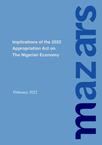Implications of the 2022 Appropriation Act on The Nigerian Economy
The Appropriation Act is an integral part of the economic rebuilding process of the Federal Government; especially as Nigeria joins the rest of the world to gradually recover from the impact of Covid 19 pandemic and the uncertainties associated with the recently announced Omicron variant. The Act is expected to have a positive or negative effect on the various national economic indicators. This newsletter examines the possible effects on the macroeconomic variables underpinning the budget and other underlying assumptions. This includes exchange rates, inflation rates, Gross Domestic Product (GDP) Oil Prices and Oil production. Again, the newsletter considers the details of the budget by critical sector and the fiscal and real sector implications.
In discussing the implications of the 2022 Appropriation Act on the Nigerian economy, the rest of the newsletter is organised into: Budgeted Revenue; Budgeted Aggregate Expenditure by Critical Sector; Review of the Critical Sectoral Allocations; Assumptions Underlying the budget; Fiscal Implications; Real Sector Implications; and Conclusion. Kindly click on the link below to download the full newsletter

